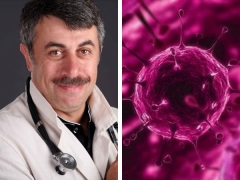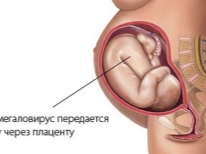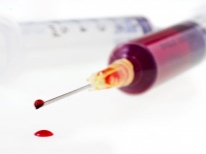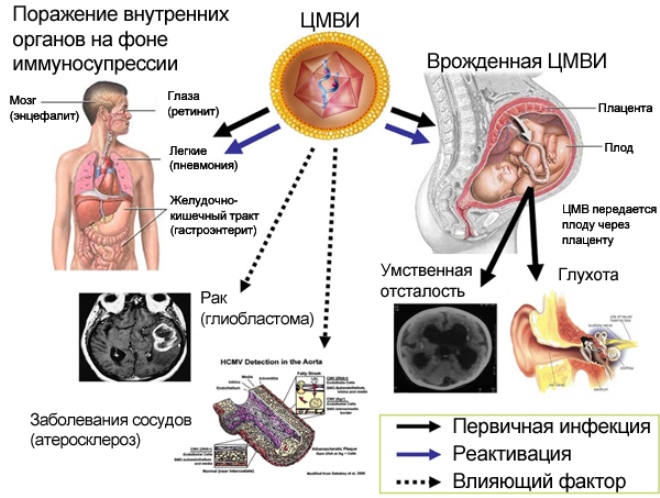Dr. Komarovsky about cytomegalovirus infection
Cytomegalovirus is detected in the child. Despite the wide distribution of this agent around the planet, there is practically no knowledge of him about ordinary inhabitants. At best, someone once heard something, but what, no longer remember. Dr. Evgeny Komarovsky told in an accessible form that this is a virus, how it is dangerous and what to do if, in blood tests, a child has found this “terrible beast”. We give you the opportunity to review information from a famous doctor.
About virus
Cytomegalovirus belongs to the family of herpes viruses of the fifth type. It is quite interesting when viewed through a microscope - its shape resembles a round prickly shell of chestnut fruit, and in a section it looks like a gear.
Hitting a person, this virus causes a cytomegalovirus infection. However, he is not so aggressive: after getting into the body, he can live quite peacefully there for a long time without denoting his presence. For this “tolerance” it is called a conditionally pathogenic virus, which goes into reproduction and causes disease only with certain factors. The main one is weakened immunity. The most susceptible to infection are people who take a lot of medicine for any reason, live in an environmentally-polluted area, often and in large quantities using household chemicals.
Cytomegalovirus loves to settle in the salivary glands. From there he travels around the body.
By the way, the body gradually produces antibodies to it, and if they accumulate enough, even a weakened immune system can no longer cause a cytomegalovirus infection.
Ways of Transmission
If for adults the main way of infection is sexual, then for children it is kisses, contact with the saliva of a person infected with the virus, therefore it is sometimes called the kiss virus.
Also, the mother, a large cytomegalovirus infection, transmits it to the fetus during pregnancy, and this can cause quite serious defects in its development. The baby may become infected during childbirth by contact with the mucous membranes of the birth canal. In addition, the baby can get an infection with the mother with milk in the first days of your life.
Another route of cytomegalovirus transmission is blood. If the crumbs had replaceable blood transfusions from a donor who has such a virus, as well as an organ transplant from an infected donor, then the child will definitely become cytomegalovirus carriers.
Danger
Evgeny Komarovsky cites the following fact: on the planet 100% of elderly people somehow had contact with cytomegalovirus. Among adolescents, about 15% of those who already have antibodies to this agent are detected (that is, the disease has already been postponed). By 35-40 years old, antibodies to CMV are found in 50-70% of people. By retirement, the number of people with immunity to the virus is even higher. Thus, it is rather difficult to talk about any excessive danger of a virus of the fifth type, because many people who have been ill do not even know about such an infection - it went completely unnoticed for them.
The virus is dangerous except for pregnant women and their unborn children, but also under the condition that the collision of the future mother with CMV during gestation is the first time. If a woman has previously been ill, and antibodies have been found in her blood, then there is no harm for the child.But the primary infection during pregnancy is dangerous for the baby - he may die or there is a high risk of congenital malformations.
If the baby is infected during pregnancy or immediately after childbirth, then doctors say about congenital cytomegalovirus infection. This is a pretty serious diagnosis.
If the child has caught the virus already in his own conscious life, they say about the acquired infection. It can be overcome without much difficulty and consequences.
Parents most often ask: what does it mean if they found antibodies to cytomegalovirus (IgG) in the baby’s blood test and, on the contrary, CMV was given +? There is nothing to worry about, says Yevgeny Komarovsky. This does not mean that the child is sick, but suggests that there are antibodies in his body that will not allow the cytomegalovirus to do its “dirty deed”. They worked out on their own, as the child had already had contact with this virus.
Worry should begin if the child in the results of the blood test is IgM +. This means that there is a virus in the blood, but there are no antibodies yet.
Symptoms of infection
The presence of a cytomegalovirus infection in a newborn is determined by the doctors of the children's department of the maternity hospital. Immediately after the appearance of the crumbs, they make an extended blood count.
In the case of acquired infection, parents should be aware that the incubation period lasts from 3 weeks to 2 months, and the disease itself can last from 2 weeks to one and a half months.
Symptoms even for a very attentive mother will not cause the slightest doubt and suspicion - they very much resemble a common viral infection:
- body temperature rises;
- respiratory symptoms appear (runny nose, cough, which quickly turns into bronchitis);
- there are signs of intoxication, the child has no appetite, he complains of headache and muscle pain.
If a child with the immune system is all right, then it will give a powerful rebuff to the virus, its spread will be stopped, and those IgG antibodies will appear in the baby’s blood. However, if the toddler doesn’t have enough of its own protection, the infection can “lie low” and acquire a sluggish, but deep-seated form, in which internal organs and the nervous system are affected. In the case of a generalized form of cytomegalovirus infection, the liver, kidneys and adrenal glands, and the spleen suffer.
Treatment
It is common to treat cytomegalovirus infection by analogy with a herpetic infection, except that drugs are chosen that affect not the herpes in general, but the cytomegalovirus in particular. There are two such remedies - “Ganciclovir” and “Tsitovin”, both are quite expensive.
During the acute phase of the disease, the child is prescribed abundant drinking, taking vitamins. For uncomplicated cytomegalovirus infection, antibiotics are not needed because antimicrobial drugs do not help against viruses.
Antibacterial agents may be prescribed by a doctor in case of a complicated course of the disease, when there are inflammatory processes on the part of the internal organs.
Prevention
The best prevention is to strengthen the immune system, good nutrition, hardening, sports. If a pregnant woman does not suffer from cytomegaly and she does not detect antibodies to this virus when registering, then she will automatically fall into the risk group.
This young virus (it was discovered only in the middle of the 20th century), and therefore little studied. To date, the effectiveness of the experimental vaccine is about 50%, that is, half of the vaccinated pregnant women still get CMV.
More information about the cytomegalovirus infection will help you video Dr. Komarovsky.





















